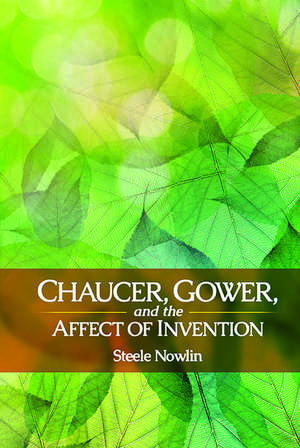Chaucer, Gower, and the Affect of Invention: Interventions: New Studies Medieval Cult
Autor Steele Nowlinen Limba Engleză Paperback – 9 noi 2016
In this book, Steele Nowlin examines the process of poetic invention as it is conceptualized and expressed in the poetry of Geoffrey Chaucer (1343–1400) and John Gower (ca. 1330–1408). Specifically, it examines how these two poets present invention as an affective force, a process characterized by emergence and potentiality, and one that has a corollary in affect—that is, a kind of force or sensation distinct from emotion, characterized as an “intensity” that precedes what is only later cognitively understood and expressed as feeling or emotion, and that is typically described in a critical vocabulary of movement, emergence, and becoming.
Chaucer, Gower, and the Affect of Invention thus formulates a definition of affect that differs from most work in the recent “turn to affect” in medieval studies, focusing not on the representation of emotion or desire, or efforts to engage medieval alterity, but on the movement and emergence that precede emotional experience. It likewise argues for a broader understanding of invention in late medieval literature beyond analyses of rhetorical poetics and authorial politics by recuperating the dynamism and sense of potential that characterize inventional activity. Finally, its close readings of Chaucer’s and Gower’s poetry provide new insights into how these poets represent invention in order to engage the pervasive social and cultural discourses their poetry addresses.
Chaucer, Gower, and the Affect of Invention thus formulates a definition of affect that differs from most work in the recent “turn to affect” in medieval studies, focusing not on the representation of emotion or desire, or efforts to engage medieval alterity, but on the movement and emergence that precede emotional experience. It likewise argues for a broader understanding of invention in late medieval literature beyond analyses of rhetorical poetics and authorial politics by recuperating the dynamism and sense of potential that characterize inventional activity. Finally, its close readings of Chaucer’s and Gower’s poetry provide new insights into how these poets represent invention in order to engage the pervasive social and cultural discourses their poetry addresses.
Preț: 273.68 lei
Nou
Puncte Express: 411
Preț estimativ în valută:
52.37€ • 54.83$ • 43.44£
52.37€ • 54.83$ • 43.44£
Carte tipărită la comandă
Livrare economică 09-23 aprilie
Preluare comenzi: 021 569.72.76
Specificații
ISBN-13: 9780814253656
ISBN-10: 0814253652
Pagini: 274
Dimensiuni: 152 x 229 x 23 mm
Greutate: 0.37 kg
Ediția:1
Editura: Ohio State University Press
Colecția Ohio State University Press
Seria Interventions: New Studies Medieval Cult
ISBN-10: 0814253652
Pagini: 274
Dimensiuni: 152 x 229 x 23 mm
Greutate: 0.37 kg
Ediția:1
Editura: Ohio State University Press
Colecția Ohio State University Press
Seria Interventions: New Studies Medieval Cult
Recenzii
“The book challenges traditional arguments that rhetorical invention played a limited role in late medieval vernacular literature. Drawing on contemporary affect theory and medieval theories of the imagination, Nowlin significantly reorients our understanding of what a secular poetics can accomplish in the poetry of Chaucer and Gower and generates fresh and persuasive readings of both poets’ works.” —Glenn Burger, Queen’s College, CUNY
Notă biografică
Steele Nowlin is Elliott Associate Professor of English at Hampden-Sydney College.
Cuprins
Introduction. The Emergence of Invention
Chapter 1. “Gooth yet alway under”: Invention as Movement in the House of Fame
Chapter 2. “Ryght swich as ye felten”: Aligning Affect and Invention in The Legend of Good Women
Chapter 3. A Thing So Strange: Macrocosmic Emergence in the Confessio Amantis
Chapter 4. “The Cronique of this fable”: Transformative Poetry and the Chronicle Form in the Confessio Amantis
Chapter 5. Empty Songs, Mighty Men, and a Startled Chicken: Satirizing the Affect of Invention in Fragment VII of the Canterbury Tales
Conclusion. From Ashes Ancient Come: Affective Intertextuality in Chaucer, Gower, and Shakespeare
Chapter 2. “Ryght swich as ye felten”: Aligning Affect and Invention in The Legend of Good Women
Chapter 3. A Thing So Strange: Macrocosmic Emergence in the Confessio Amantis
Chapter 4. “The Cronique of this fable”: Transformative Poetry and the Chronicle Form in the Confessio Amantis
Chapter 5. Empty Songs, Mighty Men, and a Startled Chicken: Satirizing the Affect of Invention in Fragment VII of the Canterbury Tales
Conclusion. From Ashes Ancient Come: Affective Intertextuality in Chaucer, Gower, and Shakespeare
Descriere
Steele Nowlin examines the process of poetic invention as it is conceptualized and expressed in the poetry of Geoffrey Chaucer (1343–1400) and John Gower (ca. 1330–1408).
















